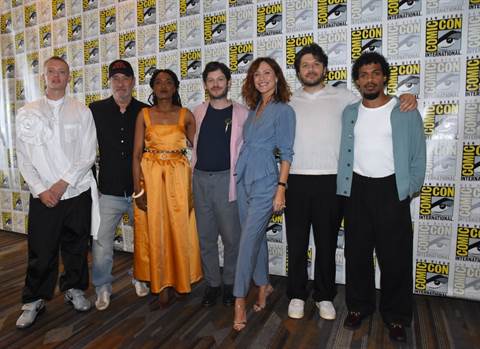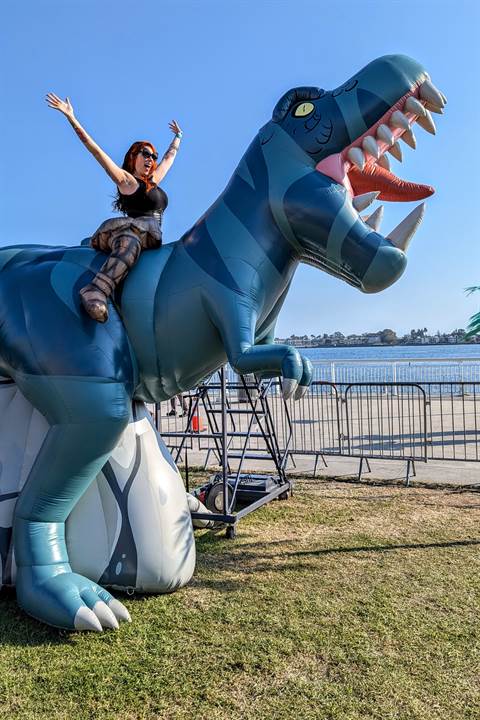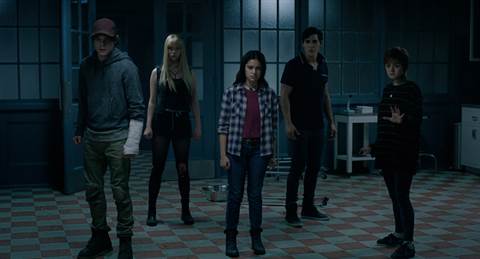
Creepshow, Shudder's upcoming streaming series, made an appearance at this year's San Diego Comic-Con and held a sneak peek and round table discussion to give some insight into the production. FlickDirect was on hand to sit in with cast member Tricia Helfer (Van Helsing), to talk about the show
Interviewer: So how did you end up with Creepshow? You've done many, many things. You kind of have your choice of projects, why did you, what attracted you to it?
Tricia Helfer: It was a lovely offer I had not seen. I haven't been big into comics and I know I'm at Comic-Con, but in terms of, I wasn't aware of kind of the history of, you know, Creepshow in, you know, the Creepshow and Creep Show 2 in the 80s and Stephen King or George Marrow and also, you know, the comics, it's 50s and sixties era. Right. And I guess just, I'd always kind of been a little bit scared of horror and some, I don't mind doing it, filming it, but watching it, it's, you know, like I don't like being woken up in the middle of the night scared and you know, hiding under my bed and type thing.
Tricia Helfer: So, but I know Stan, obviously, I know Greg Nicotero. I've always been amazed by his work. And so, he just, he called, he called me up and he said, hey, I've got this like you know, a little gore of vignette thing. I think you'd be great for it. And so I read it and I thought it was fantastic and, and signed on.
Interviewer: Can you tell us about your stories?
Tricia Helfer: My character Olivia Lane is a very high-powered CEO and she decides who to give a promotion to. I don't think it's the wrong choice, but there's a slight element of a selfish reason that she chooses Tom to go away instead of Cecilia and it kind of comes back to haunt her.
Tricia Helfer: So it's, you know, a story of a little bit of guilt, her kind of losing her mind a little bit, her conscience of making this decision. And of course there's a death involved and yeah, it's about that. And so, I'm alone a lot in terms of the episode where I'm stuck in an elevator and dealing with the demons that come along with not knowing if what's happening is real or if I'm manifesting it by my own guilt. So that's the story.
Interviewer: So, would you say it was based on a karma issue? You made a decision and then it came back around a little bit.
Tricia Helfer: You know, a bit of that. I'm still not convinced that the decision was the wrong one, but because there was an element of selfishness, you know, not wanting this character - turns out that the younger protege is also her lover. And so the job would have sent the person away to Europe to work. But you know, my lover was expecting a promotion and you could say she was using me more than I made a bad decision to keep her around.
Tricia Helfer: You know, who's to say Tom wasn't the better choice.
Interviewer: Right.
Tricia Helfer: So, it's a little bit of karma, but it's also a little bit of just, having this woman that is not used to anyone telling her no, but also, she's losing her mind in many, many ways. And she's stuck in an elevator and there's been an earthquake, so she's literally trapped in the elevator for hours and hours and hours on end and you start to, you know, get dehydrated and claustrophobia. You start to just lose your mind completely. She really doesn't know if she's losing her mind or not.
Tricia Helfer: It is a heightened world, but there also is a grounded-ness to it. The heightened part is much more the graphics and the extreme of what happens to Celia coming back to life you know, as her decomposition starts. So, in terms of performance, I just looked at it more of just portraying this character that accidentally kills her lover and is distraught over it. She doesn't do it on purpose. It's a complete accident and she is distraught over it but then makes the wrong decision.
Tricia Helfer: This is probably where the karma came back to bite her in the ass - when she makes the wrong decision. And I guess a lot of people in an extreme circumstance like that, you know, they bolt as opposed to doing the right thing and sitting there and waiting for the police. She decided she's just going to cover it up because who's going to believe her that Celia fell over the couch and impaled herself on a trophy? She makes the wrong decision to try and take care of herself. What I love about the show is that it has kept that part where you start in a panel and you end in a panel. All that element is there.
Tricia Helfer: In terms of portraying the character, I didn't play her more heightened. There's a camp element to the Creepshow one. I'd say in mine, there isn't necessarily that, but there are some humorous elements that the audience might find funny that the character doesn't find it funny. The character is not having a good time. So, I think if you, at least for myself as an actor, if I try and heighten that myself, I don't think I'm giving truth to the character. Do you know what I mean? In the circumstances she was in, I didn't play her camp, but there are some elements where she laughs over the absurdity of it herself, you know, because she's just like, I can't believe this is kind of happening, but it's almost more of like…
Interviewer: A shock?
Tricia Helfer: A shock, a release, you know? Almost like a nervous laughter type thing as opposed to really finding it funny.
Interviewer: Circling back on Creepshow, we were talking about the special effects. Are most of them practical effects? Or are they mostly CG or even a mixture of CG and practical?
Tricia Helfer: Everything that we did, most of them were practical. I haven't seen the finished edit, so there may be some that are exaggerated or added on to, but I don't think so. I think mine was pretty much all practical, which he's a master at, and again, I can't speak for the other ones.
Tricia Helfer: But no, with ours it really is. It was mostly the decomposition of Celia.
Tricia Helfer: Thank you, guys.



